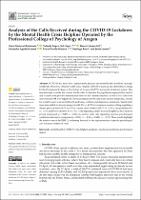Por favor, use este identificador para citar o enlazar este ítem:
https://repositorio.usj.es/handle/123456789/951
| Título : | Analysis of the Calls Received during the COVID-19 Lockdown by the Mental Health Crisis Helpline Operated by the Professional College of Psychology of Aragon |
| Autor: | Monreal-Bartolome, Alicia



Lopez-Del-Hoyo, Yolanda 


Cabrera-Gil, Itxaso Aguilar-Latorre, Alejandra 

Puebla-Guedea, Marta 
Boira, Santiago 

Lanero, Jesus 
|
| Palabras clave : | Mental health; COVID-19; Crisis helpline; Pandemic; Psychological distress; Psychological impact |
| Fecha de publicación: | 2-mar-2022 |
| Editorial : | MDPI |
| Citación : | Monreal-Bartolomé, A.; López-Del-Hoyo, Y.; Cabrera-Gil, I.; Aguilar-Latorre, A.; Puebla-Guedea, M.; Boira, S.; Lanero, J. Analysis of the Calls Received during the COVID-19 Lockdown by the Mental Health Crisis Helpline Operated by the Professional College of Psychology of Aragon. Int. J. Environ. Res. Public Health 2022, 19, 2901. https://doi.org/10.3390/ ijerph19052901 |
| Resumen : | COVID-19 has had a direct impact on the physical and mental health of millions of people worldwide. Therefore, a Mental Health Crisis Helpline (MHCH) was set up and offered free of charge by the Professional College of Psychology of Aragon (COPPA) during the lockdown period. This research aims to study the reasons for the calls, to describe the population segments that used it, and to analyse the possible relationships between the variables studied. A total of 1411 calls were answered and 598 were registered. The main reasons for the calls were: anxiety symptoms, concern for a relative, previous mental health problems, conflicts, and depressive symptoms. Significantly more men called for anxiety symptoms (60.8% vs. 49.5%) versus more women calling regarding a chronic physical illness (3.5% vs. 0.7%), concern about a relative (22.7% vs. 12.4%), care guidelines (6% vs. 1.3%), and bereavement (6.2% vs. 2%). Calls regarding conflict increased slightly as the lockdown period progressed (p < 0.001; r = 0.15), in contrast with calls regarding previous psychological conditions and anxiety symptoms (p = 0.035; r = -0.09; p = 0.005; r = -0.12). These results highlight the intensive use of the MHCH, confirming the need for the implementation of specific psychological care resources in times of crisis. |
| URI : | https://repositorio.usj.es/handle/123456789/951 |
| ISSN : | 1660-4601 |
| Aparece en las colecciones: | Artículos de revistas |
Ficheros en este ítem:
| Fichero | Descripción | Tamaño | Formato | |
|---|---|---|---|---|
| Analysis of the Calls Received during the COVID-19 Lockdown by the Mental Health Crisis Helpline Operated by the Professional College of Psychology of Aragon.pdf | 726,14 kB | Adobe PDF |  Visualizar/Abrir |
Este ítem está sujeto a una licencia Creative Commons Licencia Creative Commons

